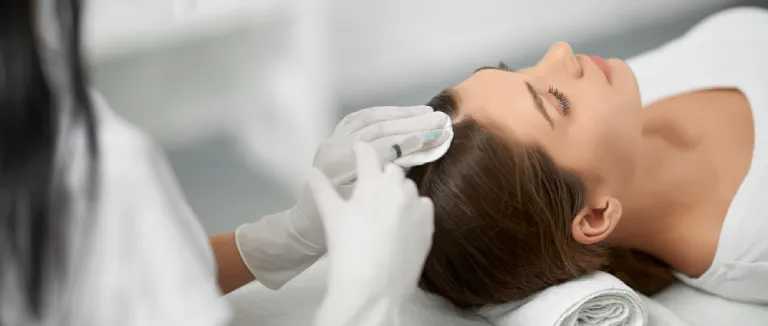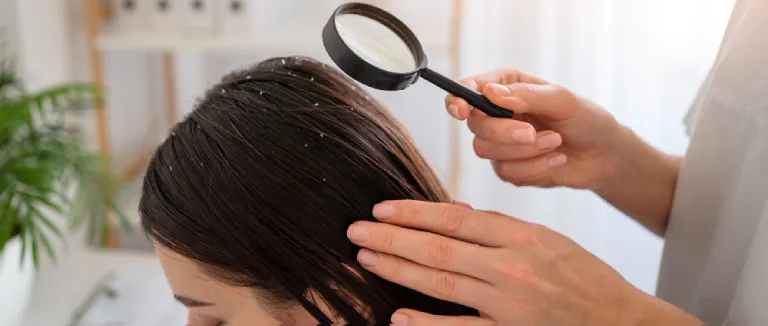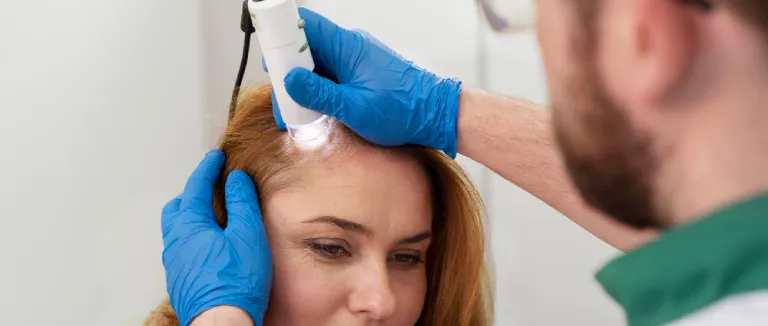What is Scalp Eczama? Scalp Eczema Treatment Options
Scalp eczema, also known as seborrheic dermatitis, is a common skin condition that affects the scalp, causing discomfort and frustration for those who experience it. Characterized by redness, itching, and flaking, scalp eczema can be a chronic and recurrent issue for many individuals. Understanding this condition is crucial for effective treatment and management.
This blog will explore scalp eczema's symptoms and impact on daily life. By shedding light on the causes and triggers of scalp eczema, we aim to empower readers with the knowledge needed to seek appropriate treatment options. With the right understanding, individuals can make informed decisions about their scalp eczema care, leading to improved symptom management and a better quality of life.

Understanding Scalp Eczema
Scalp eczema is a prevalent condition affecting people of all ages, from infants to adults. While it can occur in individuals of any ethnicity or gender, specific demographics, such as infants, individuals with compromised immune systems, and those with neurological conditions like Parkinson's disease, may be more prone to developing scalp eczema. Eczema in hair is a multifactorial condition influenced by various causes and triggers. While the exact cause is not fully understood, factors such as genetic predisposition, overactive oil glands, and an overgrowth of the yeast Malassezia play a role. These factors can disrupt the normal functioning of the skin, leading to inflammation, redness, and itching.
Several triggers can exacerbate scalp eczema symptoms, including hormonal changes, stress, cold and dry weather, certain medications, and compromised immune systems. Certain environmental factors like humidity and excessive sweating can contribute to flare-ups. By understanding the causes, motivations, and demographics of scalp eczema, individuals and healthcare professionals can work together to develop tailored treatment plans and effectively manage this common scalp condition.
Don't wait any longer to address your scalp eczema. You can contact Liv Hospital in Turkey now and take the first step towards a healthier scalp and a happier you.
Scalp Eczema Treatment Options
The treatment for eczema on the head depends on the severity of the condition and may vary from person to person. Here are some common approaches and options for eczema treatment:
Topical corticosteroids
Topical corticosteroids are available in various strengths, are anti-inflammatory creams or ointments that effectively reduce redness, itching, and inflammation associated with scalp eczema. It is crucial to follow healthcare professionals' directions when using them to ensure safe and appropriate usage.
Topical calcineurin inhibitors
Non-steroidal creams or ointments, like tacrolimus and pimecrolimus, effectively suppress the immune response that leads to inflammation. They provide an alternative to corticosteroids and can be beneficial in managing scalp eczema symptoms in those areas.
Antifungal treatments
When a fungal infection is suspected, healthcare professionals may prescribe antifungal therapies. These treatments, available in medicated shampoos, creams, or oral medications, effectively combat the overgrowth of yeast, including Malassezia. They are specifically targeted to address the fungal aspect of scalp eczema and help alleviate associated symptoms.
Antihistamines
Antihistamines are suggested to alleviate itching and enhance sleep quality in scalp eczema. While they effectively reduce itching symptoms, it's important to note that they do not target the root cause of scalp eczema. Antihistamines provide temporary relief by blocking histamine receptors, but a comprehensive treatment approach is necessary to address the condition's underlying cause.
Phototherapy (UV light therapy)
Phototherapy, also known as UV light therapy, involves controlled exposure to ultraviolet light to alleviate symptoms and reduce inflammation in scalp eczema. It is a treatment administered under medical supervision to ensure safety and effectiveness. By targeting the affected areas with specific wavelengths of light, phototherapy can provide relief and improve the overall condition of the scalp.
Looking for world-class care for scalp eczema? You can trust Liv Hospital in Istanbul for exceptional treatment, advanced technologies, and a compassionate approach.

Scalp Eczema Treatment At Home
Eczema treatment at home is vital in managing scalp eczema and promoting overall skin health. Self-care practices empower individuals to participate in their treatment and alleviate symptoms actively. Gentle shampooing and proper scalp hygiene are crucial in minimizing irritation. Using mild, fragrance-free shampoos and avoiding hot water helps maintain a healthy scalp. Moisturizing the scalp effectively with hypoallergenic moisturizers helps combat dryness and itching. Regularly applying moisturizer after washing hair can provide much-needed hydration.
The triggers for scalp eczema include harsh hair products, extreme temperatures, stress, and certain fabrics. Individuals can gain insight into what exacerbates their condition by keeping a diary to track symptoms and potential triggers. Stress management plays a vital part in scalp eczema management. Stress can trigger flare-ups and intensify symptoms. Relaxation techniques, regular exercise, adequate sleep, and engaging in activities that promote well-being can help manage stress levels.
Don't let scalp eczema hold you back. You can visit Liv Hospital in Turkey to receive expert guidance and comprehensive treatment for your scalp eczema.

Complications And Managing Flare-ups
Complications and managing flare-ups are crucial aspects of scalp eczema treatment. Scalp eczema can lead to potential complications, including secondary infections and hair loss or thinning. Scratching the affected area can break the skin barrier, making it more susceptible to bacterial or fungal infections. Recognizing the early signs of a flare-up is essential to manage and prevent complications effectively. Pay attention to increased redness, itching, or scales or flakes. Promptly addressing flare-ups can minimize their severity and duration.
During flare-ups, gentle care is vital to avoid further irritation. Avoid scratching or picking at the affected area, as this can worsen inflammation and lead to complications. Instead, focus on gentle cleansing with mild, fragrance-free products and moisturizing the scalp to maintain hydration. If home care measures do not provide sufficient relief or symptoms worsen or spread, it is advisable to consult a healthcare professional. They can provide appropriate medical interventions, such as stronger topical medications or oral treatments, to manage severe flare-ups and prevent complications.
Take control of your scalp eczema. You may contact Liv Hospital in Istanbul today to schedule a consultation with our renowned dermatologists.
LIV Hospital - Comprehensive Care Tailored For You
Managing scalp eczema requires a comprehensive approach that combines professional advice and self-care strategies. Seeking professional advice is crucial for developing personalized treatment plans that address the specific needs of individuals. Healthcare professionals can guide medication usage, offer advanced treatments, and monitor progress to ensure effective management of scalp eczema.
For advanced scalp eczema treatment, consider visiting Liv Hospital in Turkey. With state-of-the-art facilities, experienced healthcare professionals, and a comprehensive range of services, Liv Hospital is dedicated to providing personalized care for scalp eczema and other dermatological conditions for advantageous prices in Turkey 2023. You can take a step towards effective management by choosing Liv Hospital.
Frequently Asked Questions
Scalp eczema, often called seborrheic dermatitis, typically presents as scaly, itchy, and red patches on the scalp. Key symptoms include stubborn dandruff (yellowish or white flakes), greasy scales, and in some cases, temporary hair thinning due to inflammation. Dermatologists diagnose it through a physical examination of the scalp and by ruling out other conditions like psoriasis or fungal infections.
While scalp eczema is a chronic condition that can flare up periodically, it can be effectively managed with the right treatment. Most cases respond well to medicated shampoos containing ingredients like ketoconazole, selenium sulfide, or zinc pyrithione. For more severe flare-ups, doctors may prescribe topical corticosteroids or calcineurin inhibitors to reduce inflammation and itching quickly.
* Contents of this page is for informational purposes only. Please consult your doctor for diagnosis and treatment. The content of this page does not include information on medicinal health care at Liv Hospital








